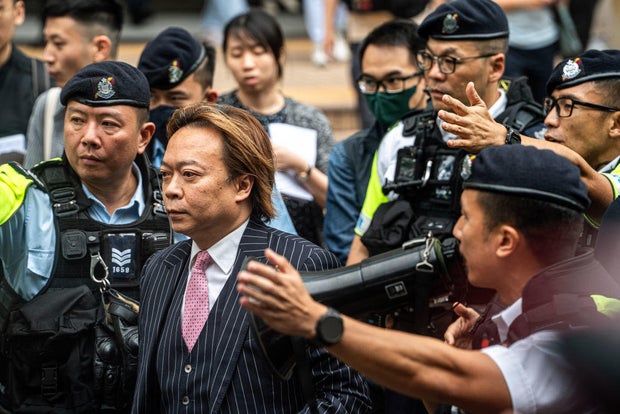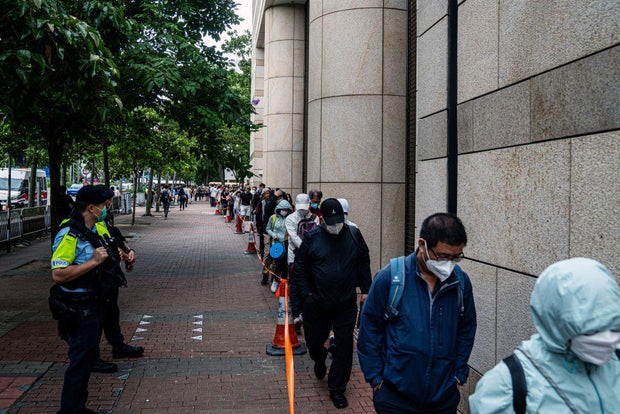A court in Hong Kong on Thursday convicted 14 pro-democracy activists in the city’s largest national security case under a 2020 law imposed by Beijing that has virtually eradicated public dissent.
Former lawmakers Leung Kwok-hung, Lam Cheuk-ting, Helena Wong, and Raymond Chan were declared guilty. However, the three justices who were appointed by the government to supervise the case acquitted former district councilors Lee Yue-shun and Lawrence Lau. Individuals who are found guilty may be sentenced to life imprisonment.
In 2021, they were among 47 democracy advocates who were prosecuted for their participation in an unofficial primary election. They were accused by prosecutors of attempting to obstruct Hong Kong’s government and remove the city’s leader by obtaining the legislative majority required to indiscriminately veto. May 3rd
They have stated that the subversion case they were involved in demonstrates the use of the security law to suppress the political opposition in the wake of significant anti-government protests in 2019. However, the governments of Beijing and Hong Kong maintain that the law has contributed to the restoration of stability in the city and that judicial independence is being safeguarded.Beijing
pledged to preserve the city’s Western-style civil liberties for 50 years when Britain returned Hong Kong to China in 1997. Nevertheless, Hong Kong authorities have significantly restricted free speech and assembly in the name of preserving national security since the implementation of the 2020 law. Numerous activists were arrested, suppressed, or compelled to embark on self-exile. Numerous civil society organizations were terminated.On May 3,
i, a media magnate, an outspoken Beijing critic, and a proponent of free speech, was on trial in Hong Kong in December on charges of colluding with foreign forces under the 2020 law. However, his supporters contended that his genuine transgression was his criticism of the Communist Party’s rule in China and its suppression of freedom in Hong Kong. His trial is still ongoing.Apple Da
In August 2020, Hong Kong police looked into Ily, a well-known Chinese-language tabloid that Lai owned, and they found him. Since that time, he has been incarcerated.r since.
The prosecution of the primary case involves pro-democracy activists from all sides of the political spectrum. Included in this group are legal scholar Benny Tai, former student leader Joshua Wong, and a dozen former legislators, including Claudia Mo and Leung Kwok-hung.
Thirty-one of them, including Tai, Wong, and Mo, entered guilty pleas to the charge of conspiracy to commit subversion. They are more likely to receive reduced jail sentences and will be sentenced at a later date.
along with sixteen other individuals, entered a plea of not guilty and were subjected to a non-jury trial. Mitigation hearings will be scheduled to determine the sentences of those convicted following the verdicts.
Before 6 a.m. on Thursday, dozens of residents had queued up outside the court building, which was under police security, to reserve a seat in the public gallery for the verdicts. Some supporters, who were among the first in line, arrived as early as Wednesday evening.
Stanley Chang, a social worker and acquaintance of one of the 16 defendants, reported that he arrived at the site at 4 a.m. due to his concern that he would not be able to secure a seat. Chang stated that there were few actions that supporters could take to assist them and that attending the hearing is a form of business.
in my thirties and would like to offer some assistance to my companion and the individuals I observed in the news,” he stated.The he
Ringing was a historic occasion, according to SL Chiu, who only provided his initials out of concern for government retribution. He stated that he had compiled messages from other individuals in a sketchbook for the 47 activists in order to demonstrate his support. He intended to dispatch them, if feasible.”Hong
Kongers continue to reside in this location.” We have not abandoned our efforts. “We are still with you all,” he stated. said.
Lee Yue-shun, one of the accused, stated on Facebook on Wednesday night that Thursday was akin to a special graduation ceremony for him, despite the fact that graduation is typically a time for sharing pleasure with family and friends.
may be the most accurate representation of the collective helplessness of our generation,” he stated.The ob
The objective of the July 2020 primary was to identify pro-democracy candidates who would subsequently participate in the official election. It attracted an unexpectedly high turnout of 610,000 electors, which accounted for more than 13% of the city’s registered electorate.At tha
At the time, the pro-democracy movement aspired to achieve a legislative majority in order to advocate for the 2019 protest demands, which included democratic elections for the city leader and increased police accountability.Howeve
The government postponed the legislative election that would have followed the primary, citing public health concerns during the coronavirus pandemic. The electoral laws were subsequently revised, resulting in a significant decrease in the public’s ability to vote and an increase in the number of pro-Beijing legislators who were responsible for making decisions on behalf of the city in the legislature.The re
ferendum was also criticized by Beijing as a challenge to the security law, which criminalizes secession, subversion, and collusion with foreign forces to intervene in the city’s affairs, as well as terrorism.









